Undergrad student Physics Bibliophile This blog is about a fool's journey (my journey) And my books And my sketch book And my introvert confessions
Don't wanna be here? Send us removal request.
Text



A celebration of MARK ROTHKO (1903 – 1970) who created a new, passionate form of abstract painting— meticulous in its attention to colour, balance and depth, expressing ‘basic human emotions – tragedy, ecstasy, doom…’
697 notes
·
View notes
Text
A Glitch in Istanbul: Not a Book Review
youtube
It's fair to say that no Turkish author depicted Istanbul in fiction as faithfully as Orhan Pamuk. The city becomes a character in his writings. But he faced some unusual problem when the English translation of his tribute to Istanbul first published in UK. This content traces back that minor, but unusual element from the book's publishing history.
#orhan pamuk#istanbul#turkey#turkish literature#oğuz atay#hakan günday#tezer özlü#nazim hikmet#sabahattin ali#yaşar kemal#my name is red#faber and faber#the black book#umberto eco#the name of the rose#Youtube
1 note
·
View note
Text

Moses Levy, Beach and Apuane (1923)
"She was sitting on her lounge chair, a book open on her knees, but she wasn't reading. With the gaze of a person searching for something in vain, her eyes often migrated to the sea, which meanwhile had filled with bathers and boats."
— Alberto Moravia (Agostino, Chapter 2)

2 notes
·
View notes
Text
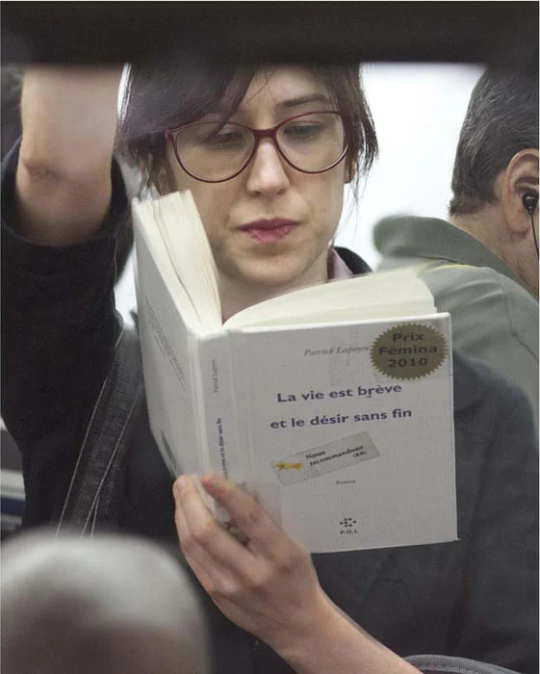
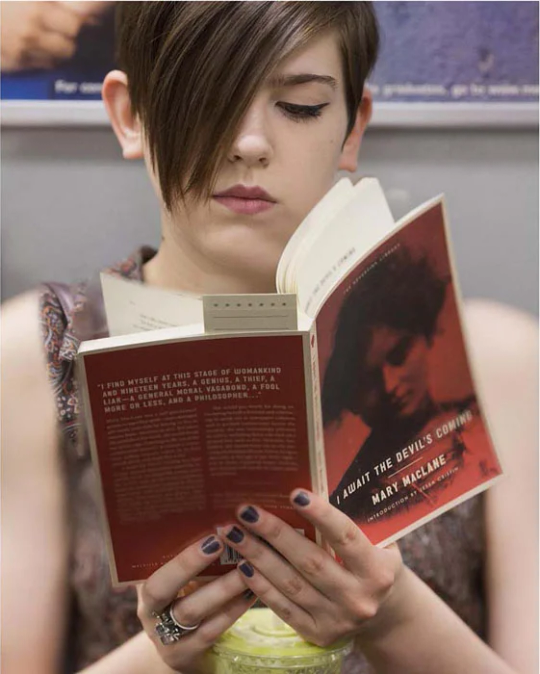


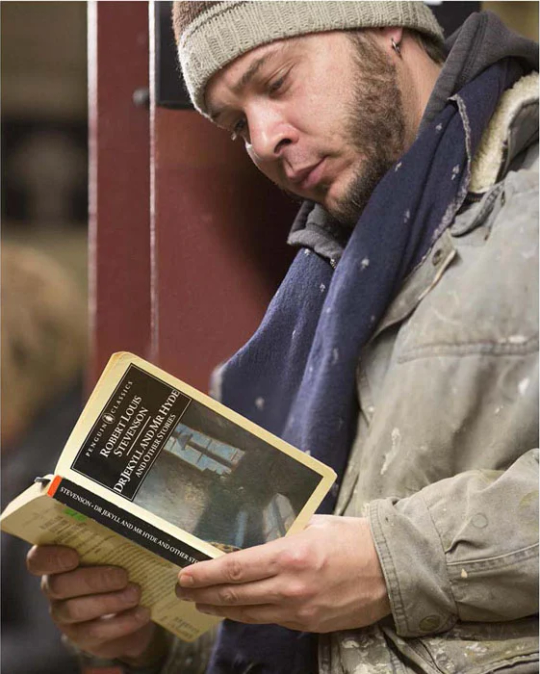



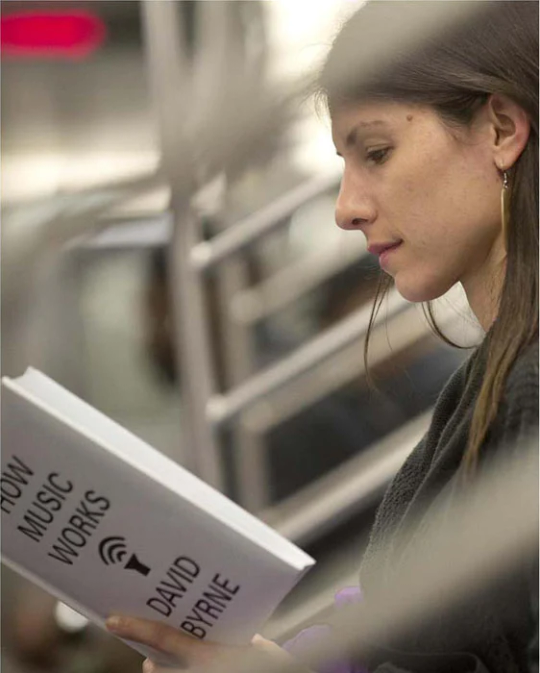

Photos from The Last Book by Reinier Gerritsen, who spent 13 weeks over 3 years scouring the subway system of New York City for riders reading books.
9K notes
·
View notes
Text
A-Z Book Recommendations
@macrolit‘s idea, my version.
Originally I aimed to list only one work per author, but I have Umberto Eco and Péter Esterházy twice, tant pis.
~ A ~ Anna Karenina by Leo Tolstoy
~ B ~ Brave New World by Aldous Huxley
~ C ~ Celestial Harmonies by Péter Esterházy
(for me at least it is about) P.E., descendant of one of the most important aristocratic families of early modern Hungary trying to cope with the weight of his family heritage; translated to English in 2004
~ D ~ Divina Commedia by Dante Alighieri
~ E ~ Egyszerű történet vessző száz oldal - a kardozós változat [Simple Story Comma One Hundred Pages - The Version with Swordfighting] by Péter Esterházy
early modern Hungary, postmodern; unfortunately no English translation is available
~ F ~ Foucault’s Pendulum by Umberto Eco
a.k.a. when you play with conspiracy theories and they turn out to be true: humans vs. texts
~ G ~ A gyertyák csonkig égnek [Embers] by Sándor Márai
in a love-hate relationship with this one; from Wikipedia with love: “The narrative revolves around an elderly general who invites an old friend from military school for dinner; the friend had disappeared mysteriously for 41 years, and the dinner begins to resemble a trial where the friend is prosecuted for his character traits.” translated to English in 2000
~ H ~ Hytti nro 6 [Compartment 6] by Rosa Liksom
young girl and middle-aged man sharing a compartment on the Trans-Siberian Railway in the 1980s
~ I ~ Iskola a határon [School at the Frontier] by Géza Ottlik
boys growing up in a military school between the two world wars
~ J ~ La jeunesse mélancolique et très désabusée d'Adolf Hitler by Michel Folco
poor Adolf’s early character development with a pinch of tasteful humour
~ K ~ Der König David Bericht by Stefan Heym
about a Jewish scholar asked by King Solomon to prepare King David’s biography with the “help” of a committee, but actually about Stalinism and its relation to Lenin and the past and history-writing in general
~ L ~ La Leçon by Eugène Ionescu
about authority and obedience
~ M ~ Macbeth by William Shakespeare
my favourite literary work!
~ N ~ The Name of the Rose by Umberto Eco
every time I re-read it, I find something new
~ O ~ One Hundred Years of Solitude by Gabriel García Márquez
~ P ~ Pride and Prejudice by Jane Austen
~ Q ~ Historiarum Sui Temporis Libri Quinque by Rodulfus Glaber
there’s this historical / literary text from the 11th century, just because I needed something with Q
~ R ~ Le Roi des Aulnes by Michel Tournier
creepy French guy trying to define himself, the world, and the relation between the two in the 30s and the second WW
~ S ~ Sátántangó by László Krasznahorkai
power and interpersonal relationships in a small community in late socialist Hungary (80s); also watch the 7h long movie version directed by Béla Tarr
~ T ~ A test angyala [The Angel of the Body] by “Jolán Sárbogárdi” (Lajos Parti Nagy)
brilliant parody of cheap romantic novels with very advanced linguistic inventions
~ U ~ Ulysses by James Joyce
~ V ~ Verhovina madarai [The Birds of Verhovina] by Ádám Bodor
slow decay of a secluded village in the Carpates
— and a little cheating now: —
~ W ~ Struwwelpeter by Heinrich Hoffmann
creepy children’s book from 19th-century Germany with blood, fire, and death by starvation. good night, sweet dreams
~ X ~ Oxford Advanced Learner’s Dictionary, 9th Edition
shut up, I like it
~ Y ~ Making History by Stephen Fry
prevent Hitler’s birth, ruin your life, and … I won’t spoil it for you, read it
~ Z ~ Жизнь и необычайные приключения солдата Ивана Чонкина [The Life and Extraordinary Adventures of Private Ivan Chonkin] by Vladimir Voinovich
well, if you transliterate the title… satire about the Soviet army and everyday life in 40s USSR
223 notes
·
View notes
Text

❝The great books are best when not only they read well, but they smell nice. A new book smells fine, but an old book smells even better.❞
—Ray Bradbury, in conversation with Sam Weller, Western University of Medicine, October 8, 2010.
10 notes
·
View notes
Text

"[B]ut I don't have to worry about that. After all, there's no proof. To me this is a false diary, though no human being can be so honest as to become completely false."
— Yukio Mishima (Thirst for Love, 1950)
#yukio mishima#japanese literature#japanese novels#books#thirst for love#penguin books#penguin twentieth century classics#penguin classics
13 notes
·
View notes
Text
10 Classic Book Recommendations
I’ve read a lot of non-English classics over the last couple of years (all translated into English because I am not bilingual) and I thought it’d be fun to share some of my favourites!
This post contains affiliate links and they're marked with an asterisk (*) - you obviously don't need to use them.
---
The Pillow Book by Sei Shōnagon (1002)
Originally written in Middle Early Japanese (translated by Meredith McKinney)
A collection of essays, anecdotes, poems, observations and musings from Sei Shōnagon’s time as court lady to Empress Consort Teishi in Heian Japan
This is one of my favourite classics because found myself relating to a woman who lived over 1,000 years ago and it was wonderful. Some things have obviously changed – we’re from different times and places – but this book reminded me of how similar we are to the people that came before us.
Bookshop.org UK*
Around the World in Eighty Days by Jules Verne (1873)
Originally written in French (translated by William Butcher)
An adventure novel
There’s something wonderfully superficial about this book. By this, I mean that the book doesn’t look at anything in depth because Fogg is in a race against the clock and has no time to dwell upon things.
Project Gutenberg (tr. G. M. Towle) | Bookshop.org UK*
The Narrow Road to the Deep North and Other Travel Sketches by Matsuo Bashō (1702)
Originally written in Early Modern Japanese (translated by Yuasa Nobuyuki)
A travelogue interwoven with poetry
The opening lines are stunning and reading this book made me feel free in a time when everyone was restricted.
Bookshop.org UK*
Notes from a Dead House by Fyodor Dostoevsky (1862)
Originally written in Russian (translated by Richard Pevear & Larissa Volokhonsky)
Semi-autobiographical philosophical fiction
Bleak and depressing and so, so interesting. Dostoevsky gives us a real insight into what life was like in exile in Siberia.
This isn’t the translation I read but, apparently, this one is much better and I intend to pick it up myself very soon.
Bookshop.org UK*
The Odyssey by Homer (c. 8th century BCE)
Originally written in Homeric Greek/Ancient Greek (translated by Emily Wilson)
Epic poem
It follows Odysseus, king of Ithaca and Greek hero, and his journey home after the Trojan War.
I have read many a translation of the Odyssey over the years and I love (almost) all iterations of it but Emily Wilson’s translation is beautiful.
Bookshop.org UK*
Divine Comedy by Dante Alighieri (1320)
Originally written in Italian (translated by C. H. Sisson)
Poetry and religious philosophy
Dante travels through Hell, Purgatory, and Paradise with Virgil and Beatrice as his guides. Inferno will always be my favourite section of the poem but I really love Paradisio too.
Bookshop.org UK*
Poetic Edda (c.985)
Originally written in Old Norse (translated by Carolyne Larrington)
A collection of anonymous Old Norse narrative poems that tell mythological and historical stories.
This is the only translation I’ve read because I wanted something relatively accessible for my first foray into the Poetic Edda but I’ve also heard good things about the Hollander translation.
Bookshop.org UK*
Metamorphoses by Ovid (8 AD)
Originally written in Latin (translated by Rolfe Humphries)
A narrative poem that chronicles the history of the world from its creation to the deification of Julius Caesar. It includes various myths, such as Diana and Actaeon, Arachne, and Orpheus and Eurydice.
Although I’ve recommended the Humphries translation, you could pick up any verse translation and still enjoy it. I personally love Arthur Golding’s translation* from 1567 because it was the first direct translation from Latin to English and it’s a reflection of the poetry of its time.
Bookshop.org UK*
The Outsider by Albert Camus (1942)
Originally written in French (translated by Sandra Smith)
Also published as The Stranger in English
A philosophical novel
Camus wrote the best absurdist novels and this one is fantastic. I can’t really describe it but it had a great impact on 18-year-old me and it was my introduction to absurdism and existentialism (but don't tell Camus I described his novel as existentialist).
Bookshop.org UK*
We by Yevgeny Zamyatin (1921)
Originally written in Russian (translated by Bela Shayevich)
Dystopian novel – inspired Huxley’s Brave New World and Orwell’s 1984
The book depicts a world of harmony and conformity within a united totalitarian state. Everyone is a number and the city’s buildings are constructed almost entirely of glass. It’s such an unnerving book.
Bookshop.org UK*
---
If you pick up any of these books based on this post, please let me know what you think!
Support me on Ko-fi
274 notes
·
View notes
Photo
Here's another one







Fifty Unofficial Shades of Vitruvian Man
22 notes
·
View notes
Text
#206: 4 Reasons to Keep a Journal

I’m a big fan of journaling. The great thing about it is that it means something slightly different to everyone. Some people chronicle their time, recording the events of the day. Andy Warhol kept a journal where he recorded who he met and how much he spent on various things. Others focus their journaling efforts on reflection. It gives them a way of processing things in their own time. Your journal can be whatever you want it to be. It can also change over time.
In this post, I’ll cover four reasons why you should consider giving journaling a try.
Getting Warmed Up
Although many people don’t consider their journaling a part of their daily word count, it’s still writing. Even though you may never publish any of it, you’re still going through the motions of putting your thoughts on the page.
Journaling is a great way to warm up for a day of writing. It puts you in the right state of mind. In a way, the product of journaling isn’t important. It’s the process of doing it that counts. So you can let go and just write. It’s quite a liberating feeling, to be honest.
For a long time, I used to free-write every morning to get my brain started. I wrote about 2,000 words in my journal in roughly 30 minutes before moving on to the real writing. I should start doing it again.
Thinking and Reflection
When you think about it, you don’t get that much space to really think and reflect during a regular day. There’s way too many things going on. The world is filled with distractions.
Writing things down forces you to reckon with thoughts that you’d normally brush aside or ignore altogether. This can be beneficial for your mental health and to make sure you don’t end up sleepwalking through your life. I’m terrified of that, and journaling is one thing that helps me ensure that I live on my own terms.
Generating Ideas
I get so many ideas when I’m journaling. It’s not even funny. There’s something about writing that helps me think.
When I can’t quite figure something out, I’ll open my journal and just describe the situation. I write out the different options that I’ve considered so far, and almost immediately, new ideas come up.
Maybe it’s because writing forces you to slow down and sit with the problem. Maybe it’s because as you write, you’re freeing up space in your brain for new ideas.
I can’t say I fully understand it, but it works.
Taking Photos of Your Mind
All of us will have countless photographs to look at and reminisce about when we’re old — perhaps even too many. But will you remember the person that you used to be? The anxieties you had and the things you were dealing with?
Memory is notoriously unreliable, particularly when it comes to things that you don’t share with anyone.
When you write in a journal, you’re capturing the state of your mind at that very moment. Reading those sentences in 20, 30 or 60 years will transport you right back to the time when you wrote them.
Your journal is like an album of photos taken from the inside.
Where to Start?
As I said at the beginning of the post, there are no rules:
You don’t have to journal every day.
You don’t have to write about your day.
You don’t have to write about how you feel.
There’s no minimum word count.
You can change things up as often as you like.
Try a bunch of things and see what works for you. Journaling is basically writing for yourself, and it’s such a versatile tool. It may grow into a habit that changes your life.
About the Author
Hi, I’m Radek 👋. I’m a writer, software engineer and the founder of Writing Analytics — an editor and writing tracker designed to help you beat writer’s block and create a sustainable writing routine.
I publish a post like this every week. Want to know when the next one comes out? Sign up for my email list below to get it right in your inbox.
SUBSCRIBE
(I won’t spam you or pass your email to a third party. You can unsubscribe at any time.)
Past Editions
#205: It’s just Writing, July 2021
#204: What Will Your Story Look Like?, July 2021
#203: It Will Take Longer Than You Think, July 2021
#202: What Should You Focus on as a Writer?, July 2021
#201: How to Create a Compelling Story, June 2021
177 notes
·
View notes
Note
Favourite works of literary theory?
“Against Interpretation” by Susan Sontag
“Against Decoration” by Mary Karr
“The System and the Speaking Subject” by Julia Kristeva
“Word, Dialogue, and Novel” by Julia Kristeva
“Walter Pater’s Eucharist” by Benjamin Taylor
Conclusion to The Renaissance, Walter Pater
“On Beauty and Being Just” Elaine Scarry
“Transmission & the Individual Remix” by Tom McCarthy
“The Laugh of the Medusa” by Helene Cixous
“Sesame: Of Kings’ Treasuries” by John Ruskin
“The Nature of the Gothic” by John Ruskin
“Tradition and Individual Talent” by T.S. Eliot
“Days of Reading” by Marcel Proust
“E Unibus Pluram: Television and US Fiction” by David Foster Wallace
“The Art of Fiction” by Henry James
The Pound Era by Hugh Kenner
Real Presences by George Steiner
The Art of the Novel by Milan Kundera
The Art of Recklessness: Poetry as Assertive Force and Contradiction
Heroines by Kate Zambreno
Literary Women by Ellen Moers
5K notes
·
View notes
Text
Buy books, then, that you have read with profit and pleasure and hope to read and reread. Buy books that you may underscore passages and write upon the margins, thus assuring yourself that the book is your own. Keep the books that mean the most to you close at hand, one or two, if possible, on a table at your bedside. Do not hide away your favorite books or keep them locked in enclosed shelves. Do not keep them under glass.” ― Burton Rascoe, The Joys of Reading: Life's Greatest Pleasure.
192 notes
·
View notes
Text
Perhaps this is the bottom line to mental illness: incomprehensible events occur; your life becomes a bin for hoax-like fluctuations of what used to be reality. And not only that— as if it weren't enough— but you […] ponder forever over these fluctuations in an effort to order them into a coherency, when in fact the only sense they make is the sense you impose on them, out of the necessity to restore everything into shapes and processes you can recognize. The first thing to depart in mental illness is the familiar. And what takes its place is bad news because not only can you not understand it, you cannot communicate it to other people. The madman experiences something, but what it is or where it comes from he does not know.
Philip K Dick, VALIS (chapter-2)
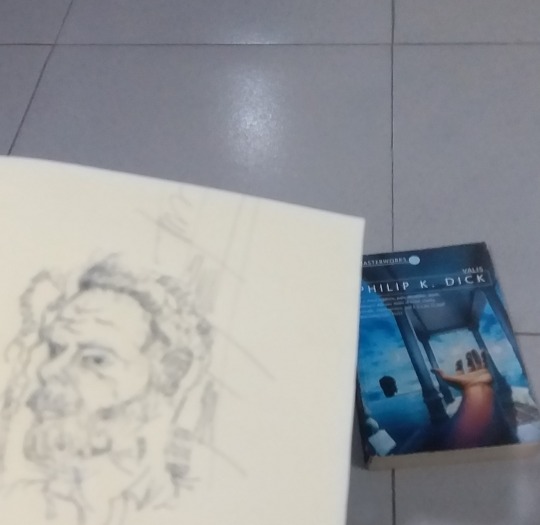
#books#used books#philip k dick#science fiction#postmodernism#mental illness#quotes#quotation#sci fi#exegesis
2 notes
·
View notes
Photo

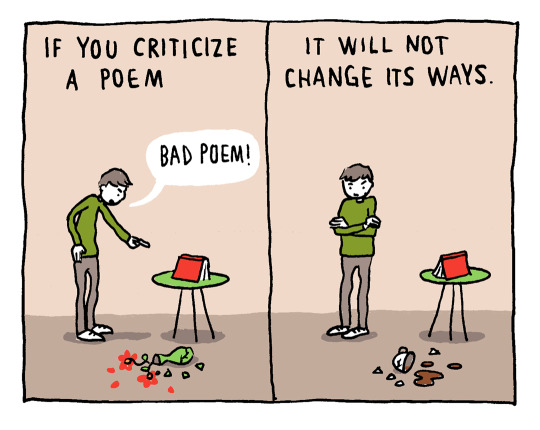
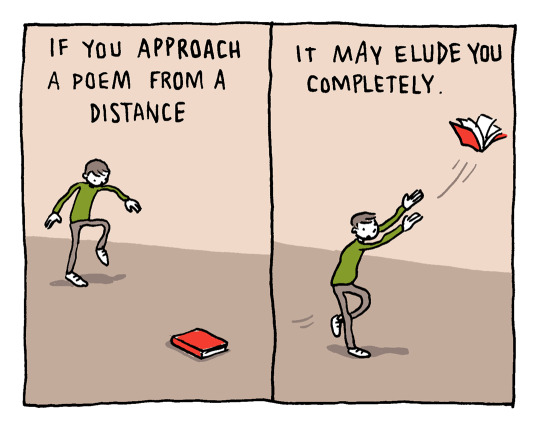
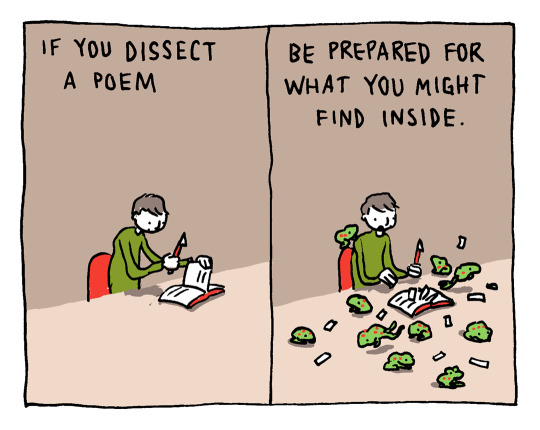
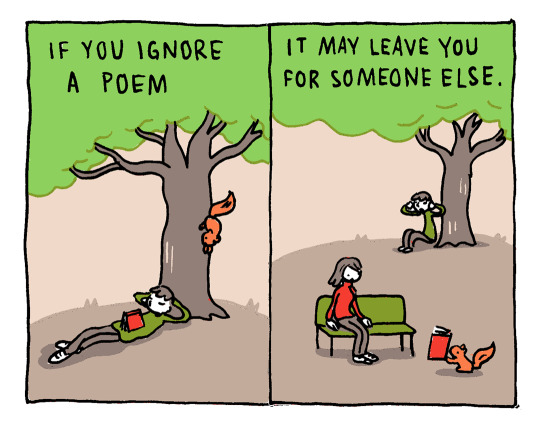
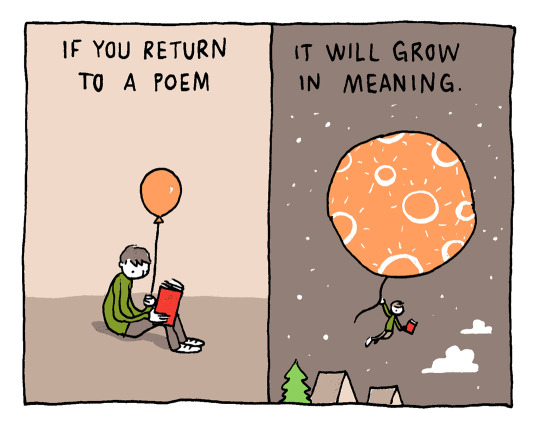

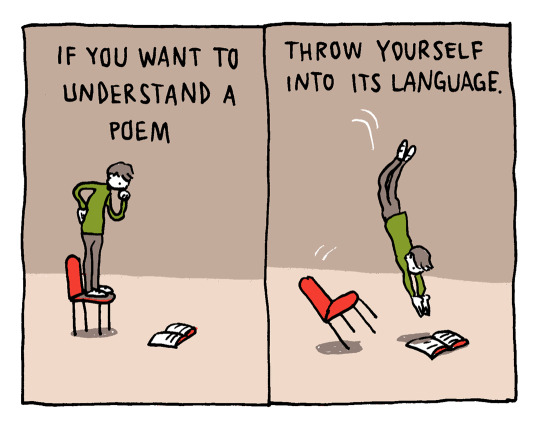
Understanding Poetry (after Mark Strand)
This comic appears in my new book, I WILL JUDGE YOU BY YOUR BOOKSHELF. You can order it from your favorite local bookstore, or find it online wherever you get your books!
17K notes
·
View notes
Text
পদার্থবিজ্ঞানের মন্থরপাঠের পক্ষে — রিচার্ড পি. ফাইনম্যান
[এই রচনাটি ফাইনম্যান লেকচারে’র পহেলা খন্ডের পহেলা অধ্যায়ের ভূমিকার সংকুচিত অনুবাদ। অনুবাদের উদ্দেশ্য খুবই সরল,— পদার্থবিজ্ঞান পড়তে শুরু করতে না করতেই অনেককেই ভারি ভারি তত্ত্বের দাঁতভাঙা পরিভাষা হেফয করতে বা আওড়াতে শোনা যায়, চারশ’ বছরের সাধনা এক রাতের যজ্ঞে অর্জন করে ফেলতে চায়; কিন্তু বাংলাঘিলুতে আদৌ তা ঢুকছে কি না তা নিয়ে কাউকে চিন্তা করতে তেমন দেখা যায় না। অথবা না ঢুকলে তা ঢোকানোর যথাযথ তরিকা কি হতে পারে তা নিয়েও অনেকে দো-টানায় ভূগতে থাকে। অনেকে পদার্থবিজ্ঞানকে কেবল তত্ত্বজ্ঞান ভেবেই চারটা বছর পার করে দেয়। অথচ সঠিক পাঠ পদ্ধতি নিয়ে বিগত শতাব্দীর শ্রেষ্ঠ মেধারা চিন্তা করে গেছেন। এর উদাহরণ হিসেবেই রিচার্ড পি ফাইনম্যানের একটা টুকরো রচনার অনুবাদ।— অনুবাদক]
যথেষ্ট বিস্ময়ের ব্যাপার, (গত দু’শ বছরের) এই সময়ে ঘটে যাওয়া কর্মযজ্ঞের বিপুলতা সত্ত্বেও এর অধিকাংশ ফলাফলের একটি বৃহদাংশ নিঙড়ে— যাকে বলা চলে, নীতি, আমাদের লব্ধ জ্ঞানের সারকথা বের করে আনা যায়। […] আপনারা জিজ্ঞাসা করতে পারেন, আমরা এই মূলনীতিগুলোতে প্রথম পাতায় পেশ ক'রে, তারপর এই বিষয়ক সম্ভাব্য সকল মামলা-মোকদ্দমার কিভাবে মীমাংসা করা যায়— তা কেন দেখাই না, যেমনটা করি ইউক্লিডিয়ান জ্যামিতিতে, যেখানে প্রথমে আমরা স্বতঃসিদ্ধগুলো জানি এবং তারপর তা থেকে আর সবকিছু প্রতিপাদন করি। (তো চার বছর ধরে পদার্থবিজ্ঞান শিখে তৃপ্ত না হয়ে, চার মিনিটেই শিখে যেতে চান?) আমরা এই তরিকায় করতে পারি না দুটি কারণে। প্রথমত, আমরা এখনো সব মূলনীতি জেনে পারি নি: আমাদের অজ্ঞতার পরিধি দিন-কে-দিন বাড়ছেই। দ্বিতীয়ত, পদার্থবিজ্ঞানের মূলনীতিগুলোর সঠিক বিবৃতি'র সাথে জড়ানো এমন আনকা বা অপরিচিত সব ধ্যান-ধারণা আছে, যে ওগুলোর বর্ণনার জন্য গণিতের উচ্চতর শাখার দরকার পড়বে। এজন্য, যে কারো রীতিমতো বেশকিছু প্রাথমিক প্রস্তুতি নিতে হয়, এমন কি পরিভাষাগুলোর অর্থ শিখতে। তো না, এটা ঐ তরিকায় করা সম্ভব নয়। আমরা এটা কেবল এক টুকরো, দু’ টুকরো করে শিখতে পারি।
Keep reading
7 notes
·
View notes
Text

2 notes
·
View notes
Text
instagram
Hi, I'm back. Heart broken again. Trying to get over it by posting about books on my Insta.
13 notes
·
View notes